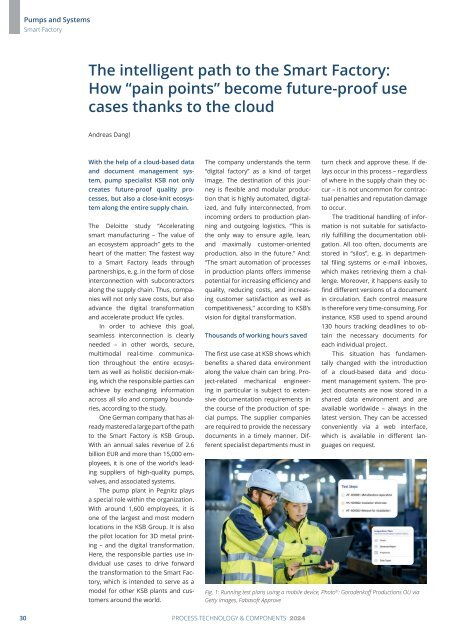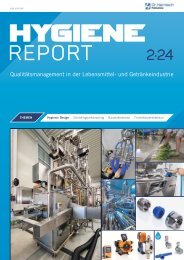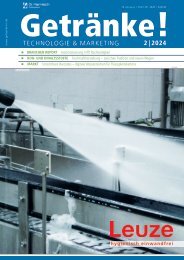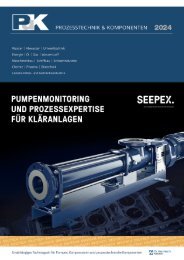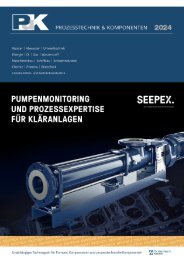PuK - Process Technology & Components 2024
A technical trade magazine with a history of more than 60 years.
A technical trade magazine with a history of more than 60 years.
You also want an ePaper? Increase the reach of your titles
YUMPU automatically turns print PDFs into web optimized ePapers that Google loves.
Pumps and Systems<br />
Smart Factory<br />
The intelligent path to the Smart Factory:<br />
How “pain points” become future-proof use<br />
cases thanks to the cloud<br />
Andreas Dangl<br />
With the help of a cloud-based data<br />
and document management system,<br />
pump specialist KSB not only<br />
creates future-proof quality processes,<br />
but also a close-knit ecosystem<br />
along the entire supply chain.<br />
The Deloitte study “Accelerating<br />
smart manufacturing – The value of<br />
an ecosystem approach” gets to the<br />
heart of the matter: The fastest way<br />
to a Smart Factory leads through<br />
partnerships, e. g. in the form of close<br />
interconnection with subcontractors<br />
along the supply chain. Thus, companies<br />
will not only save costs, but also<br />
advance the digital transformation<br />
and accelerate product life cycles.<br />
In order to achieve this goal,<br />
seamless interconnection is clearly<br />
needed – in other words, secure,<br />
multimodal real-time communication<br />
throughout the entire ecosystem<br />
as well as holistic decision-making,<br />
which the responsible parties can<br />
achieve by exchanging information<br />
across all silo and company boundaries,<br />
according to the study.<br />
One German company that has already<br />
mastered a large part of the path<br />
to the Smart Factory is KSB Group.<br />
With an annual sales revenue of 2.6<br />
billion EUR and more than 15,000 employees,<br />
it is one of the world’s leading<br />
suppliers of high-quality pumps,<br />
valves, and associated systems.<br />
The pump plant in Pegnitz plays<br />
a special role within the organization.<br />
With around 1,600 employees, it is<br />
one of the largest and most modern<br />
locations in the KSB Group. It is also<br />
the pilot location for 3D metal printing<br />
– and the digital transformation.<br />
Here, the responsible parties use individual<br />
use cases to drive forward<br />
the transformation to the Smart Factory,<br />
which is intended to serve as a<br />
model for other KSB plants and customers<br />
around the world.<br />
The company understands the term<br />
“digital factory” as a kind of target<br />
image. The destination of this journey<br />
is flexible and modular production<br />
that is highly automated, digitalized,<br />
and fully interconnected, from<br />
incoming orders to production planning<br />
and outgoing logistics. “This is<br />
the only way to ensure agile, lean,<br />
and maximally customer-oriented<br />
production, also in the future.” And:<br />
“The smart automation of processes<br />
in production plants offers immense<br />
potential for increasing efficiency and<br />
quality, reducing costs, and increasing<br />
customer satisfaction as well as<br />
competitiveness,” according to KSB’s<br />
vision for digital transformation.<br />
Thousands of working hours saved<br />
The first use case at KSB shows which<br />
benefits a shared data environment<br />
along the value chain can bring. Project-related<br />
mechanical engineering<br />
in particular is subject to extensive<br />
documentation requirements in<br />
the course of the production of special<br />
pumps. The supplier companies<br />
are required to provide the necessary<br />
documents in a timely manner. Different<br />
specialist departments must in<br />
turn check and approve these. If delays<br />
occur in this process – regardless<br />
of where in the supply chain they occur<br />
– it is not uncommon for contractual<br />
penalties and reputation damage<br />
to occur.<br />
The traditional handling of information<br />
is not suitable for satisfactorily<br />
fulfilling the documentation obligation.<br />
All too often, documents are<br />
stored in “silos”, e. g. in departmental<br />
filing systems or e-mail inboxes,<br />
which makes retrieving them a challenge.<br />
Moreover, it happens easily to<br />
find different versions of a document<br />
in circulation. Each control measure<br />
is therefore very time-consuming. For<br />
instance, KSB used to spend around<br />
130 hours tracking deadlines to obtain<br />
the necessary documents for<br />
each individual project.<br />
This situation has fundamentally<br />
changed with the introduction<br />
of a cloud-based data and document<br />
management system. The project<br />
documents are now stored in a<br />
shared data environment and are<br />
available worldwide – always in the<br />
latest version. They can be accessed<br />
conveniently via a web interface,<br />
which is available in different languages<br />
on request.<br />
Fig. 1: Running test plans using a mobile device, Photo © : Gorodenkoff Productions OU via<br />
Getty Images, Fabasoft Approve<br />
30 PROCESS TECHNOLOGY & COMPONENTS <strong>2024</strong>


